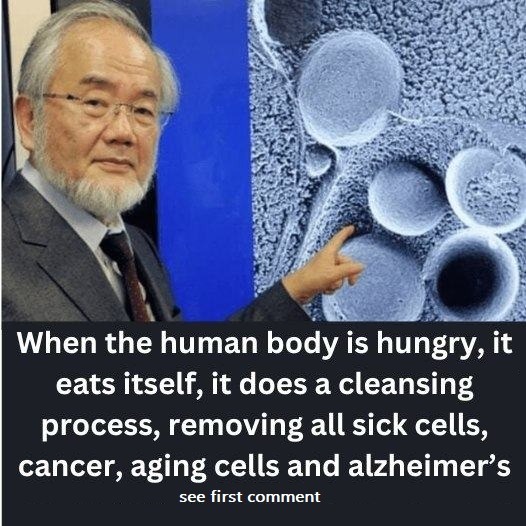The human body is a remarkable system that adapts to various conditions, including periods of hunger. When food intake is restricted, the body initiates a self-cleansing process known as autophagy, a natural mechanism that helps remove damaged cells and regenerate healthier ones. This process has gained attention for its potential health benefits, including improved metabolism, cellular repair, and longevity.
In this article, we’ll explore how the body reacts to hunger, the benefits of this self-cleansing process, and how you can support it in a healthy way.
Some key changes that occur include:
- Glycogen Depletion: The body first uses stored carbohydrates (glycogen) to provide energy for a few hours.
- Fat Breakdown: Once glycogen stores are depleted, the body begins to break down fat for energy, leading to weight loss.
- Cellular Cleansing (Autophagy): The body starts recycling damaged cells and proteins, which can have numerous health benefits.
Understanding Autophagy: The Body’s Self-Cleansing Process
Autophagy is a natural process that occurs when the body enters a fasting state. During this process, the body “eats itself” by breaking down and removing damaged cells, toxins, and unnecessary proteins. This self-cleaning mechanism is crucial for cellular health and rejuvenation.
Benefits of Autophagy:
- Cellular Repair: Autophagy helps remove old and dysfunctional cell components, allowing the regeneration of new, healthier cells.
- Improved Metabolism: This process enhances metabolic function and can support weight management efforts.
- Reduced Inflammation: By clearing out harmful cell debris, autophagy reduces inflammation in the body, potentially lowering the risk of chronic diseases.
- Anti-Aging Effects: Cellular cleansing may slow down aging by protecting against oxidative stress and DNA damage.
- Enhanced Immune Function: A well-functioning autophagy process can strengthen the immune system by removing harmful bacteria and viruses at a cellular level.
How Long Does It Take for the Body to Start Autophagy?
Autophagy typically begins after 12-16 hours of fasting, depending on individual metabolic rates and activity levels. Extended fasting periods, such as intermittent fasting (16:8 or 18:6), are often used to trigger and sustain this process.
Signs That Your Body Is in a Self-Cleansing Mode
When your body enters the cleansing phase triggered by hunger, you may notice the following signs:
- Increased Energy Levels: Once the body adapts to using fat for fuel, you might feel more energetic.
- Reduced Bloating: Autophagy helps eliminate toxins, leading to a lighter and less bloated feeling.
- Improved Focus and Mental Clarity: The body’s ability to function efficiently without food can enhance cognitive function.
- Mild Hunger Pangs: The body adjusts to longer fasting periods, and hunger signals may decrease over time.
How to Support the Body’s Natural Cleansing Process
While fasting triggers autophagy, there are several ways to support and optimize this process safely:
- Practice Intermittent Fasting: Following a structured eating window, such as 16 hours of fasting and an 8-hour eating period, can encourage autophagy.
- Eat Nutrient-Dense Foods: When you break your fast, focus on whole foods like vegetables, healthy fats, and lean proteins to provide essential nutrients.
- Stay Hydrated: Drinking plenty of water supports detoxification and helps the body flush out waste products.
- Get Enough Sleep: Quality sleep plays a critical role in cellular repair and rejuvenation.
- Exercise Regularly: Physical activity can accelerate the cleansing process and enhance fat-burning efficiency.
- Limit Processed Foods: Avoiding processed foods and sugar helps the body maintain optimal functioning during fasting periods.
Potential Risks of Prolonged Hunger
While short-term hunger and fasting can be beneficial, prolonged periods without food can have adverse effects, such as:
- Nutrient Deficiencies: Long-term deprivation can lead to vitamin and mineral shortages, affecting overall health.
- Muscle Loss: Extreme calorie restriction may cause muscle breakdown in addition to fat loss.
- Low Energy Levels: Extended fasting can lead to fatigue, dizziness, and difficulty concentrating.
It’s important to listen to your body and consult a healthcare professional before adopting any fasting routine, especially if you have underlying health conditions.
Final Thoughts
Hunger triggers a fascinating self-cleansing process in the human body, allowing it to eliminate damaged cells and promote overall health. Autophagy, the body’s natural recycling system, offers a range of benefits, from improved metabolism to cellular repair. However, it’s crucial to approach fasting and hunger mindfully to ensure you’re supporting your body’s needs without causing harm.
By understanding how the body responds to hunger and taking proactive steps, you can harness this natural process to improve your well-being and vitality.
